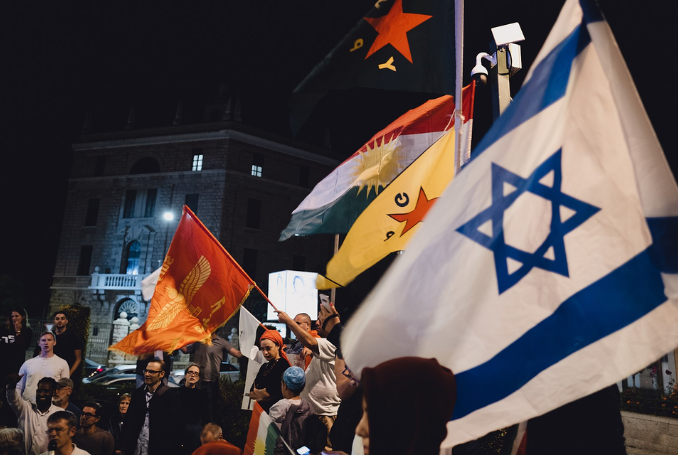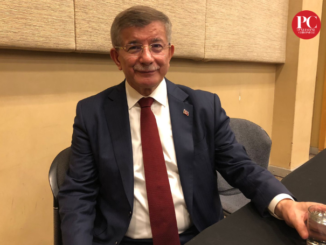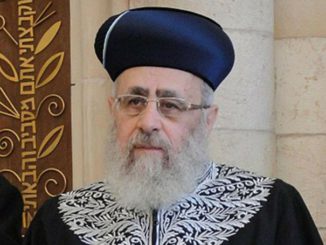
In her article published in the Al Mayadeen Arabic website, Laila Nicola, an expert in international relations at the Lebanese University, analyzes Israel’s renewed interest in forging alliances with ethnic minorities in the Middle East, a strategy rooted in the “periphery doctrine” first developed by David Ben Gurion.
In a speech delivered by Israeli Foreign Minister, Gideon Sa’ar, evaluating threats and developments after the Lebanese war and the fall of the Syrian regime, he stated: “We must view developments in this context and understand that in a region where we will always be a minority, we can form natural alliances with other minorities.”
Sa’ar emphasized that Israel should extend its hand to the Kurds and other regional minorities, describing them as “natural allies” of Israel, and stressing the “political and security benefits” of such alliances. He also suggested that Israel must engage with the Druze in Syria and Lebanon.
In a gesture towards the Kurds, Sa’ar said: “The Kurdish people are a great nation, one of the great nations that does not enjoy political independence,” and described the Kurds as “natural allies,” explaining that they are a “national minority in four diverse countries, two of which have autonomy: de facto in Syria, and de jure in the Iraqi constitution.”
In reality, Israel’s desire to ally with minorities is not a new development; rather, it is a long-standing policy that Israelis are seeking to reinvigorate following the developments of the Middle East wars of 2023-2024.
Israel and the Minorities Alliance
In the early decades after the establishment of Israel, David Ben Gurion, Israel’s first prime minister, based on advice from Eliyahu Sasson (a prominent expert and advisor), implemented the “periphery doctrine.”
In the 1950s, Ben Gurion and his associates in the Mossad and Shin Bet coined the term “Torat Haperipheria” to counter threats from the surrounding Arab states, often referred to as the “periphery states.”
This doctrine was one of four primary strategies devised by Israel in the 1950s to ensure the security of the newly established state. These strategies included forming alliances with major powers, encouraging large-scale Jewish immigration, creating a nuclear deterrent, and executing the “periphery doctrine.”
Practically, this doctrine manifested in strategic partnerships with non-Arab, pro-Western countries in the region, such as Turkey, Iran (under the Shah), and Ethiopia. These alliances helped Israel address what Tel Aviv saw as Arab hostility and the united, aggressive stance against it, while also coping with the diplomatic and economic boycotts imposed by Arab nations and maintaining a balance of power against the rise of Arab nationalism – particularly under Egyptian President Gamal Abdel Nasser.
Minorities across the Middle East were considered an “ethnic periphery” that Israel could exploit to weaken the Arab states and distract them. These included: the Christian minority in southern Sudan, the Druze in Syria and Lebanon, the Iraqi Kurds, and the Maronites in Lebanon.
Strategic Importance
The alliance between Israeli leaders and minorities in the region served a strategic Israeli need, where military control over territories within states was facilitated, these minorities were easily accessible, and they were willing to fight a common enemy. Furthermore, the costs of supporting these minorities were relatively low.
However, several developments in the 1970s led to the failure of the “periphery doctrine,” notably the Iranian Islamic Revolution, the fall of the Ethiopian emperor, and Israel’s entanglement in the Lebanese quagmire in the 1980s and 1990s, which caused a retreat from using minorities as proxies to influence or act as substitutes for the Israeli army.
Resurrecting Minority Alliances
The Druze: One day after the fall of the Syrian regime, Israeli Prime Minister Benjamin Netanyahu sent a message to the Druze in Syria, saying: “First and foremost, I extend a hand of peace to our Druze brothers in Syria, who are brothers to our Druze in Israel.”
Israelis seem to be preparing for developments in Syria by resurrecting old plans that had long been buried. In the 1970s, Israel supported the creation of a Druze state, a “buffer state” between Israel and Syria, based in areas populated by Druze in the Golan Heights and the Druze Mountain in Syria, extending into Lebanon. Based on this, Israel supported the separatist ambitions of the Druze, particularly after Druze in Israel integrated into the military and society, unlike other Arab nationalities.
The Kurds: Israeli-Kurdish communication began in the 1960s when the Kurds in Iraq attempted to secede. The interests of Israel, Iran (under the Shah), and the Kurds aligned against the Iraqi state. Israel and Iran sent small teams to northern Iraq to train Kurdish fighters in combat and guerrilla warfare, providing them with arms, equipment, and financial support. By 1965, Israel had a permanent presence in the Kurdish mountains of northern Iraq, training and supporting rebels against the Iraqi government.
Kurdish leader Mullah Barzani visited Israel at least twice (in 1968 and 1973), meeting with Israeli Prime Minister Levi Eshkol and other Israeli officials.
Following the fall of Saddam Hussein in 2003 and the granting of extensive autonomy to the Kurds within Iraq, the Israeli-Kurdish relationship deepened significantly. Despite repeated Kurdish denials, reports indicate a significant presence of Mossad in Iraqi Kurdistan.
Although there are no confirmed reports of direct relations between the Syrian Kurds and Israel, Israelis appear to be deeply interested in the fate of the Syrian Kurds after the fall of the Syrian regime.
On December 18, Israeli Foreign Minister Gideon Sa’ar met with Jens Plötner, foreign and security policy advisor to the German chancellor, where Sa’ar emphasized that “the international community has a role in protecting minorities in Syria, including the Kurdish minority, which is facing attacks and threats these days.”
(Al Mayadeen Arabic Website. Translated and Prepared by the Palestine Chronicle)








